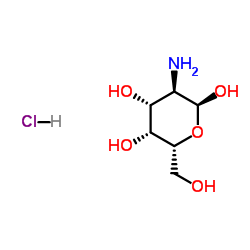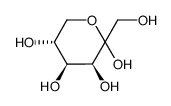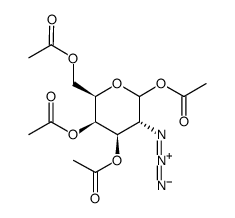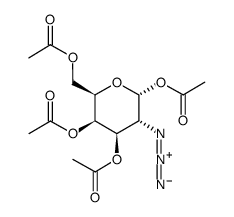D-(+)-Galactosamine hydrochloride

D-(+)-Galactosamine hydrochloride structure
|
Common Name | D-(+)-Galactosamine hydrochloride | ||
|---|---|---|---|---|
| CAS Number | 1772-03-8 | Molecular Weight | 215.63 | |
| Density | N/A | Boiling Point | 532.5ºC at 760 mmHg | |
| Molecular Formula | C6H14ClNO5 | Melting Point | 182-185 °C (dec.)(lit.) | |
| MSDS | Chinese USA | Flash Point | 275.8ºC | |
Use of D-(+)-Galactosamine hydrochlorideD(+)-Galactosamine (D-Galactosamine) hydrochloride, which is an established experimental toxin, primarily causes liver injury by the generation of free radicals and depletion of UTP nucleotides. D(+)-Galactosamine hydrochloride intoxication also induces renal dysfunction thus, renal failure is often associated with the end-stage of the liver damage. Lipopolysaccharide/D(+)-Galactosamine-induced acute liver injury is a known animal model of fulminant hepatic failure[1][2]. |
| Name | D(+)-Galactosamine hydrochloride |
|---|---|
| Synonym | More Synonyms |
| Description | D(+)-Galactosamine (D-Galactosamine) hydrochloride, which is an established experimental toxin, primarily causes liver injury by the generation of free radicals and depletion of UTP nucleotides. D(+)-Galactosamine hydrochloride intoxication also induces renal dysfunction thus, renal failure is often associated with the end-stage of the liver damage. Lipopolysaccharide/D(+)-Galactosamine-induced acute liver injury is a known animal model of fulminant hepatic failure[1][2]. |
|---|---|
| Related Catalog | |
| References |
| Boiling Point | 532.5ºC at 760 mmHg |
|---|---|
| Melting Point | 182-185 °C (dec.)(lit.) |
| Molecular Formula | C6H14ClNO5 |
| Molecular Weight | 215.63 |
| Flash Point | 275.8ºC |
| Exact Mass | 215.056046 |
| PSA | 116.17000 |
| Vapour Pressure | 5.53E-10mmHg at 25°C |
| Index of Refraction | 96 ° (C=1, H2O) |
| Storage condition | 2~8°C |
| Water Solubility | SOLUBLE |
Synonym:Chondrosamine hydrochloride; 2-Amino-2-deoxy-D-galactose hydrochlorid Section 2 - COMPOSITION, INFORMATION ON INGREDIENTS
Risk Phrases: None Listed. Section 3 - HAZARDS IDENTIFICATION EMERGENCY OVERVIEW
The toxicological properties of this material have not been fully investigated. Potential Health Effects Eye: May cause eye irritation. Skin: May cause skin irritation. Ingestion: May cause irritation of the digestive tract. Inhalation: May cause respiratory tract irritation. Chronic: No information found. Section 4 - FIRST AID MEASURES Eyes: Immediately flush eyes with plenty of water for at least 15 minutes, occasionally lifting the upper and lower eyelids. Get medical aid immediately. Skin: Get medical aid. Immediately flush skin with plenty of water for at least 15 minutes while removing contaminated clothing and shoes. Ingestion: Do not induce vomiting. If victim is conscious and alert, give 2-4 cupfuls of milk or water. Never give anything by mouth to an unconscious person. Get medical aid immediately. Inhalation: Remove from exposure and move to fresh air immediately. If not breathing, give artificial respiration. If breathing is difficult, give oxygen. Get medical aid. Notes to Physician: Section 5 - FIRE FIGHTING MEASURES General Information: As in any fire, wear a self-contained breathing apparatus in pressure-demand, MSHA/NIOSH (approved or equivalent), and full protective gear. During a fire, irritating and highly toxic gases may be generated by thermal decomposition or combustion. Extinguishing Media: Use water spray, dry chemical, carbon dioxide, or alcohol-resistant foam. Section 6 - ACCIDENTAL RELEASE MEASURES General Information: Use proper personal protective equipment as indicated in Section 8. Spills/Leaks: Clean up spills immediately, observing precautions in the Protective Equipment section. Sweep up, then place into a suitable container for disposal. Avoid generating dusty conditions. Provide ventilation. Section 7 - HANDLING and STORAGE Handling: Wash thoroughly after handling. Use with adequate ventilation. Minimize dust generation and accumulation. Avoid contact with skin and eyes. Avoid ingestion and inhalation. Storage: Store in a cool, dry place. Keep container closed when not in use. Section 8 - EXPOSURE CONTROLS, PERSONAL PROTECTION Engineering Controls: Facilities storing or utilizing this material should be equipped with an eyewash facility and a safety shower. Use adequate ventilation to keep airborne concentrations low. Exposure Limits CAS# 1772-03-8: Personal Protective Equipment Eyes: Wear appropriate protective eyeglasses or chemical safety goggles as described by OSHA's eye and face protection regulations in 29 CFR 1910.133 or European Standard EN166. Skin: Wear appropriate gloves to prevent skin exposure. Clothing: Wear appropriate protective clothing to prevent skin exposure. Respirators: Follow the OSHA respirator regulations found in 29 CFR 1910.134 or European Standard EN 149. Use a NIOSH/MSHA or European Standard EN 149 approved respirator if exposure limits are exceeded or if irritation or other symptoms are experienced. Section 9 - PHYSICAL AND CHEMICAL PROPERTIES Physical State: Powder Color: white Odor: None reported. pH: Not available. Vapor Pressure: Not available. Viscosity: Not available. Boiling Point: Not available. Freezing/Melting Point: 178 - 190 deg C (dec.) Autoignition Temperature: Not applicable. Flash Point: Not applicable. Explosion Limits, lower: Not available. Explosion Limits, upper: Not available. Decomposition Temperature: > 190 deg C Solubility in water: soluble in water Specific Gravity/Density: Molecular Formula: C6H13NO5.HCl Molecular Weight: 215.64 Section 10 - STABILITY AND REACTIVITY Chemical Stability: Stable under normal temperatures and pressures. Conditions to Avoid: Incompatible materials, dust generation, excess heat. Incompatibilities with Other Materials: Strong oxidizing agents. Hazardous Decomposition Products: Nitrogen oxides, carbon monoxide, irritating and toxic fumes and gases, carbon dioxide, chloride fumes. Hazardous Polymerization: Has not been reported. Section 11 - TOXICOLOGICAL INFORMATION RTECS#: CAS# 1772-03-8: LW5500000 LD50/LC50: Not available. Carcinogenicity: D-(+)-Galactosamine hydrochloride - Not listed by ACGIH, IARC, or NTP. Other: See actual entry in RTECS for complete information. Section 12 - ECOLOGICAL INFORMATION Section 13 - DISPOSAL CONSIDERATIONS Dispose of in a manner consistent with federal, state, and local regulations. Section 14 - TRANSPORT INFORMATION IATA Not regulated as a hazardous material. IMO Not regulated as a hazardous material. RID/ADR Not regulated as a hazardous material. Section 15 - REGULATORY INFORMATION European/International Regulations European Labeling in Accordance with EC Directives Hazard Symbols: Not available. Risk Phrases: Safety Phrases: S 24/25 Avoid contact with skin and eyes. S 26 In case of contact with eyes, rinse immediately with plenty of water and seek medical advice. S 36/37/39 Wear suitable protective clothing, gloves and eye/face protection. WGK (Water Danger/Protection) CAS# 1772-03-8: No information available. Canada CAS# 1772-03-8 is listed on Canada's NDSL List. CAS# 1772-03-8 is not listed on Canada's Ingredient Disclosure List. US FEDERAL TSCA CAS# 1772-03-8 is listed on the TSCA inventory. SECTION 16 - ADDITIONAL INFORMATION N/A |
|
~% 
D-(+)-Galactosa... CAS#:1772-03-8 |
| Literature: Journal of Carbohydrate Chemistry, , vol. 25, # 1 p. 33 - 41 |
|
~% 
D-(+)-Galactosa... CAS#:1772-03-8 |
| Literature: Journal of Carbohydrate Chemistry, , vol. 25, # 1 p. 33 - 41 |
| HS Code | 2922399090 |
|---|---|
| Summary | 2922399090 other amino-aldehydes, amino-ketones and amino-quinones, other than those containing more than one kind of oxygen function; salts thereof VAT:17.0% Tax rebate rate:9.0% Supervision conditions:none MFN tariff:6.5% General tariff:30.0% |
|
An ENU-induced splicing mutation reveals a role for Unc93b1 in early immune cell activation following influenza A H1N1 infection.
Genes Immun. 15(5) , 320-32, (2014) Genetic and immunological analysis of host-pathogen interactions can reveal fundamental mechanisms of susceptibility and resistance to infection. Modeling human infectious diseases among inbred mouse ... |
|
|
Towards a full integration of optimization and validation phases: An analytical-quality-by-design approach
J. Chromatogr. A. 1395 , 88-98, (2015) • An enhanced quality-by-design strategy throughout the analytical method lifecycle. • Quantitative design space: an innovative approach for development of analytical methods. • Integrated approaches ... |
|
|
Inhibition of plasmin attenuates murine acute graft-versus-host disease mortality by suppressing the matrix metalloproteinase-9-dependent inflammatory cytokine storm and effector cell trafficking.
Leukemia 29(1) , 145-56, (2015) The systemic inflammatory response observed during acute graft-versus-host disease (aGVHD) is driven by proinflammatory cytokines, a 'cytokine storm'. The function of plasmin in regulating the inflamm... |
| Galactosamine |
| 2-Amino-2-deoxy-D-galactopyranose hydrochloride D-Chondrosamine hydrochloride |
| D-GalactosaMine HC1 |
| 2-deoxy-2-amino-D-galactose hydrochloride |
| α-D-Galactopyranose, 2-amino-2-deoxy-, hydrochloride (1:1) |
| GALACTOSAMINE HCL |
| 2-aMino-2-deoxy-L-idose |
| D-GALN HCL |
| D-(+)-Galactosamine hydrochloride |
| 2-Amino-2-deoxy-D-galactopyranose hydrochloride,D-Chondrosamine hydrochloride |
| 2-amino-2-deoxy-D-galactopyranose hydrochloride |
| Chondrosamine Hydrochloride |
| 2-Amino-2-deoxy-α-D-galactopyranose hydrochloride (1:1) |
| D-GALACTOSAMINE HCL |
| CHONDROSAMINE |
| EINECS 217-198-1 |
| MFCD00135830 |
| (2R,3R,4R,5R)-2-Amino-3,4,5,6-tetrahydroxyhexanal hydrochloride |
| D-CHONDROSAMINE HCL |
| GALACTOSAMINE HCL,D |
| N-Acetylgalactosamine hydrochloride |


 CAS#:84278-00-2
CAS#:84278-00-2 CAS#:67817-30-5
CAS#:67817-30-5 CAS#:68733-19-7
CAS#:68733-19-7 CAS#:1114-34-7
CAS#:1114-34-7![Fmoc-Thr[GalNAc(Ac)3-α-D]-OH structure](https://image.chemsrc.com/caspic/350/116783-35-8.png) CAS#:116783-35-8
CAS#:116783-35-8
